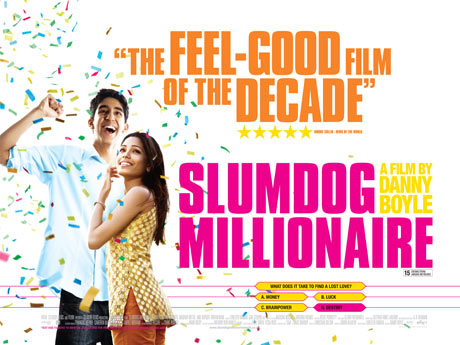 I felt so relieved today to see this article on Alternet, and to know I was not alone in thinking Slumdog Millionaire was not all it was cracked up to be. I saw it and enjoyed it, but did not see why it was sooooo hyped and why it was the best picture of the year – many other films made me think more, and feel more.
I felt so relieved today to see this article on Alternet, and to know I was not alone in thinking Slumdog Millionaire was not all it was cracked up to be. I saw it and enjoyed it, but did not see why it was sooooo hyped and why it was the best picture of the year – many other films made me think more, and feel more.
My explanation to people was that it didn’t leave me with anything when I left the theater. What was the point? the message? the inspiration? That some poor kid could win a quiz show? Yeah, but it’s not likely and even if one does, most won’t, they’ll keep starving and being exploited.
And if that’s ever gonna change, its gonna have nothing to do with game shows, and everything to do with people of spirit and character and drive working together, doing something difficult and fighting and sacrificing for change. This is why Milk made much more of an impact on me than Slumdog – it gives you an inspiring image of a way to live and improve the world. Slumdog is beautifully made, makes you feel good while you watch it, has a kickin’ soundtrack, but ultimately offers nothing to the soul. Making everything depend on destiny means that little depends on character, on your will. It means that, in the end you’re powerless.
And the critique in Alternet latches on to that very fact by asserting that the characterization of the slum was entirely skewed, and that it is a vibrant, creative, buzzing place, full of energy and individual hopes. How sad to deny that story – human, engaging, inspiring, real – by making everything come down to “destiny.”
…it is important to acknowledge their efforts and agency [those of the slum’s many organizations], along with the simple fact that these communities, despite their grinding poverty, have valuable lives, warmth, generosity, and a resourcefulness that stretches far beyond the haphazard and purely individualistic, Darwinian sort portrayed in the film.
This part sums it up beautifully – and better than I could:
After a harrowing life in an anarchic wilderness, salvation finally comes to Jamal, a Christ-like figure, in the form of an imported quiz-show, which he succeeds in thanks to sheer, dumb luck, or rather, because “it is written.” Is it also “written,” then, that the other children depicted in the film must continue to suffer? Or must they, like the stone-faced Jamal, stoically await their own “destiny” of rescue by a foreign hand?
You can’t leave things to “destiny” and you certainly can’t tell people that’s what they have to wait for, or depend upon.
Read the rest of the article btw, lots of interesting info on the real slums of Mumbai.
February 24, 2009 at 11:18 pm
Classic question of fate versus free will. Why must they be mutually exclusive? Faith bridges the chasm — but destiny requires our action, of our own volition.
To squeeze a little more Milk out of the cold, withering teat of Hollywood is always a small miracle.
February 25, 2009 at 10:21 am
Well, I’m not of the same opinion. Slumdog is the classic story of the good guy who get the love of the girl at the end, after a journey of suffering, but the story is giving to us in a different way, the story is told using stories inside the story, flahbacks within flashbacks. And the film has the perfect tempo.
February 25, 2009 at 1:26 pm
Hi, I feel as if it’s sedition, but I agree. I loved the movie, it was my kind of movie, but I left the theater and in know way did I take it with me.
February 26, 2009 at 5:35 pm
There is another interesting element to the Slumdog story. Simply, it is a huge global success, and it is NOT American. This is an Indian story in and Indian setting, with Indian actors. Nearly everyone who sees this movie sees another part of the world which is outside of their normal experience. How many non-American, non-European movies are seen by so many millions of people worldwide? Not many…This film opens minds to other places, other cultures, especially for the immense majority of filmgoers who have never been in an developing country.
Keep up the good work Guiri!
July 8, 2009 at 8:28 pm
i thought that this film was a bunch of non-creative bullshit. film of the year, are you kidding me? Will someone please watch former films of the year like titanic, casablanca, gladiator… and then tell me it even compares with them? the point is is that this film is a giant turd of dog shit compared to those other films. I have shitted turds that were more captivating then this grundel-wad. what a joke. jesus, what a fucking joke. i don’t care if india sucks and the world is poor and fucked up, i knew that before i saw this, and i wasted 10 bucks at the theatre. so next time you want to have a movie date, just with the hopes of getting your fuck stick played with at the end of the night, rent something else. fuck, ernest goes to prison is 10 times as entertaining.